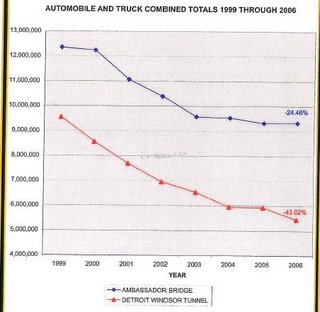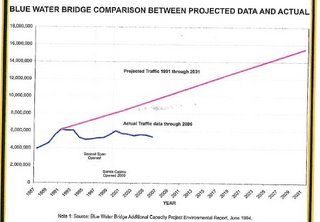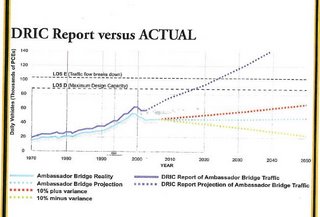A Tale Of Two Trips
 If anyone wants to know why Canada needs the Senate, read the transcript of the Bill C-3 session today.
If anyone wants to know why Canada needs the Senate, read the transcript of the Bill C-3 session today.Perhaps we have finally had a Governmental authority recognize the mess that the border file is. Perhaps we have found a body that understands the real issues and is prepared to deal with them. Perhaps, if we are fortunate, the Senate will prevent the waste of billions of Canadian taxpayer dollars by the Government on a Megaproject that has never made sense! "Sir John A. Macdonald, Canada's first prime minister, said the Senate was to be a place of "sober second thought" so that legislation would receive proper, careful consideration before finally becoming law." Perhaps we do need still such a Chamber where we have experienced people who are capable of making decisions without the fear of being tossed out in an election.
I had talked about the Senators' reaction to our Mayor's presentation to them a week ago. To be blunt about it, I did not think what he said went over very well.
The testimony of the Bridge Co. was received in a markedly different fashion but before I get into that, I should point out that Eddie was hurt badly based on what he said in front of the Senators. Whoever made the tactical mistake not to have Eddie there testifying when Dan Stamper was in Ottawa made a gigantic blunder. Here is how it played out in the transcript:
- Mr. Stamper: The second graph shows the
 actual traffic volumes at the Windsor border crossing since 1999. I am disappointed that the mayor of Windsor would not himself answer your questions about the tunnel's decrease in traffic of over 40 per cent.
actual traffic volumes at the Windsor border crossing since 1999. I am disappointed that the mayor of Windsor would not himself answer your questions about the tunnel's decrease in traffic of over 40 per cent. - The Chairman: Are you truly surprised to see the federal government, under Bill C-3, confirm and even reinforce its authority in respect of international bridges and tunnels?
Mr. Stamper: No. We agree that the international bridges, tunnels, railroads are all for the good of Canada and should be governed by the federal government, not by the province and not by the municipalities. We all saw last week with the mayor's presentation that having municipalities with veto power is not good at all for Canada in these kinds of issues. - "Senator Tkachuk: We had the mayor of Windsor attend here last week and we had all these pictures of traffic backup well into the city. It looked like a disaster actually. We do have issues and problems of traffic and backups obviously. Were those old pictures?
Mr. Stamper: Those were old pictures with snow on the ground, and we have not had snow in Windsor yet. Those pictures are at least two years old. We did not have that kind of problem in Windsor after we built additional booths for U.S. custom and opened them at the end of 2004. That perception that the mayor tried to create is old reality. It is not current reality of what happens at the border."
Let me deal with what happened. Again, I was NOT there but did hear the Webcast "live."
The tone of the session was much different this time around. The presentations by the Bridge Co. reps were very open and direct. The questioning by the Senators was tough and probing on key points, not mere pleasantries. Answers were given not to avoid answering but to enlighten experienced business people and legislators who have been around for a some time. When the Senator, who introduced Bill C-3 in the Senate initially says "Your presentation was certainly candid. Obviously, you have some legitimate concerns and we are here to try to understand them" then that is a lot better than being called a "politician." One would have to be pleased when the Chair states at the end "Thank you very much. We learned a lot today."
My impression was that the Senators "got it" and understood that there were significant issues that had to be dealt with concerning ownership and operation of the border crossing. As one Senator said "This has become a much more complex and acrimonious process from when I first read the bill." Another stated "At the beginning, when this bill came in we were led to believe, and I am not saying there was any bad faith, it was going to be a bill that would pass easily..." A third said "I wish to echo the sentiments...This seemed to be slam dunk before...If is has been bureaucrats that have been pushing this envelope, with various ministers from different government, I do not know how they got this far."
Matthew Moroun put it directly and to the point:
- "What we are worried about with Bill C-3 – because it is only for us, it cannot be for the public bridges that are already controlled by Transport Canada – is that it gives the Minister of Transport the authority to say Ambassador Bridge, we are going to put a ceiling on your business. We are going to cap your growth and decide that we are not going to allow you to build a new span across the river. Your future is over.
Instead, we are going to authorize a new span across the river less than a mile away that we control as Transport Canada, your brand new competitor – nice to meet you. Then we are going to set up marshalling yards; or, by decree, now that we have our new Bill C-3, tell all the commercial vehicles that they have to go to the new bridge and not your bridge anymore. After all, we have the authority to do that now under Bill C-3. We have the ability to cut off your growth, ruin your future and start a new competitor bridge right next door because we are the players on the field and the referee at the same time."
The key concern of the Bridge Co. was clearly set out and framed in a way that brought together the everlasting DRIC process, the concept of public/private partnerships that Government Ministers have been pushing lately and Bill C-3 in this manner:
- "Bill C-3 in combination with the work of the Detroit River International Crossing Project – DRIC -- is an effort by bureaucrats to ensure that a public-private border crossing is to be constructed and to be made profitable at our expense and that of the taxpayers of Canada."
 Several graphs were shown that showed the huge gaps between actual volumes at a crossing and consultant projected volumes leading to a comment: "A private investor would be infuriated by this disparity between projected and actual traffic."
Several graphs were shown that showed the huge gaps between actual volumes at a crossing and consultant projected volumes leading to a comment: "A private investor would be infuriated by this disparity between projected and actual traffic."
That comment arose in the context of a supposed Blue Water Bridge investor if it was a P3 bridge.
Imagine how Macquarie must feel since it "advised the Global Infrastructure Fund (GIF) on the acquisition of Detroit & Canada Tunnel Corporation (DCTC)...Macquarie originated the opportunity for GIF and arranged $US53.5 million of senior debt finance." The Tunnel's volume is down over 40% since 1999!
Isn't this a Megaproject running amuk: overestimating growth, underestimating cost. Or as a Senator said "This is not abnormal, though. This happens with every bill that comes before us. "That is all it is going to cost." I remember the $80 million for the gun registry. It will be $2 billion now."
 Don't you find it interesting when looking at the DRIC Report vs. Actual, that the DRIC projected line upward showing traffic growth is very similar to that of the Blue Water bridge consultant! Can you imagine a pension fund placing $3 billion of its pensioners' and contributors' funds into the project and then seeing the traffic numbers tumble. Who would get in trouble when the fund lost money when actual is far below forecast with no hope of improvement?
Don't you find it interesting when looking at the DRIC Report vs. Actual, that the DRIC projected line upward showing traffic growth is very similar to that of the Blue Water bridge consultant! Can you imagine a pension fund placing $3 billion of its pensioners' and contributors' funds into the project and then seeing the traffic numbers tumble. Who would get in trouble when the fund lost money when actual is far below forecast with no hope of improvement?
Hopefully, analysts will do a proper job on numbers, not just crunching DRIC numbers before making an investment decision. Do you really think that anyone would invest? Now do you understand what Bill C-3 is all about? It is absolutely required to allow the P3 bridge to take business away from the existing crossings even though they are struggling financially themselves now. As an example, the $6.6M Tunnel dividend to Windsor will effectively be gone next year as traffic volume plummets by another 9-10%.
A significant issue arose over the Presidential  Permit process. Bill C-3 seemed to be moving away from the harmonization with the US position rather than matching it as was desired by Transport Canada.
Permit process. Bill C-3 seemed to be moving away from the harmonization with the US position rather than matching it as was desired by Transport Canada.
- "A Presidential permit process in the U.S. specifically states that this act shall not be construed to adversely affect the rights of those operating bridges previously authorized by Congress to repair, replace or enlarge existing bridges."
It was not all a success for the Bridge Co. however. As one Senator said "Some of your suggestions essentially call for an exemption of the Ambassador Bridge. We have done a good job, we had the old legislation, leave us alone. However, I do not think that is in the cards."
However, this Senator went on, and supported by others, also said
- "The question is: What can we do with the act so that your concerns are fairly and properly treated? In particular, to ensure you are not penalized because you have invested a considerable amount of money trying to improve the bridge and now, in the middle of that process, a new process is being suggested under the act itself.
I am trying to obtain a de minimis suggestion from you as to how we can amend the bill in a way that would be fair and seemly of the Ambassador Bridge but still preserve the right of the federal government to manage the elements that exist."
- "We would be glad to look at each individual's section or clause of the bill...
If you would like us to look at the whole bill and propose amendments just to the sections we think do not apply to us, we would be glad to do that and work with Transport Canada to accomplish that..."
By far, the most humourous lines of the session, but the most telling, were the following:
- "Senator Mercer: I am a little conflicted here because the bill is introduced by a Conservative government who is pro-business. I am a left-wing Liberal, and I seem to find myself on the side of defending the private enterprise here, which is okay. I find it an interesting juxtaposition."
Finally, the Minister of Finance should recognize that he may have serious credibility problems respecting P3s in Canada that need to be addressed as a result of the Ambassador Bridge matter:
- "Therefore I want to be sure we understand that I hope we do not think we will be fast tracking this.
Above and beyond the interests of the Ambassador Bridge, this government and governments will be going forward with PPPs in the future. We are hoping that more public-private partnerships will exist to share the responsibilities between the public and the private enterprise, whether it is Highway 50 or Highway 30 in Quebec or other bridges to be built. If we are not going to have respect for private projects that exist and that have been going well for 60 or 70 years, how can we expect private investors to risk, whether it is the "competing" project or the "existing" projects?"
In case you wondered why I am showing the photo of the Ambassador Bridge of yesterday, note the number of lanes then as compared with today. If the bridge could not be adapted, then, with wider vehicle dimensions today, the Bridge could not function. Is that any different than today?
In the end, the Bridge Co. fared much better in front of the Senators than did our Mayor. I hope he listened to the WEBCAST as well since he was not in attendance to watch in order to learn how to answer questions. Will that reflect into acceptable Legislative changes, only time will tell.
Eddie might also learn how to deal with delegations. The Bridge Co. reps were scheduled to speak for 10 minutes; they were allowed to speak, uninterrupted, for 30 minutes. The question period lasted over an hour. In other word, one is not a slave to a Procedural By-law but must have the common sense to allow a delegation to continue as needed. Perhaps Eddie one day may develop the confidence to do that.


<< Home